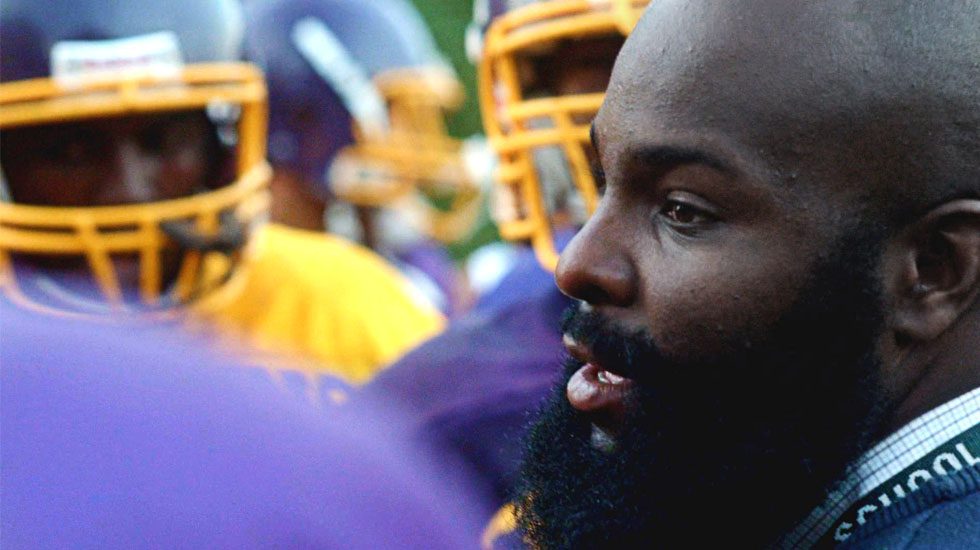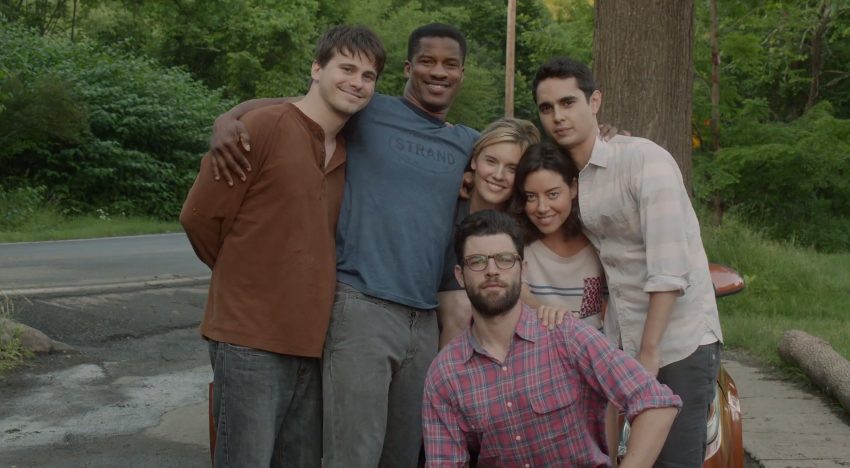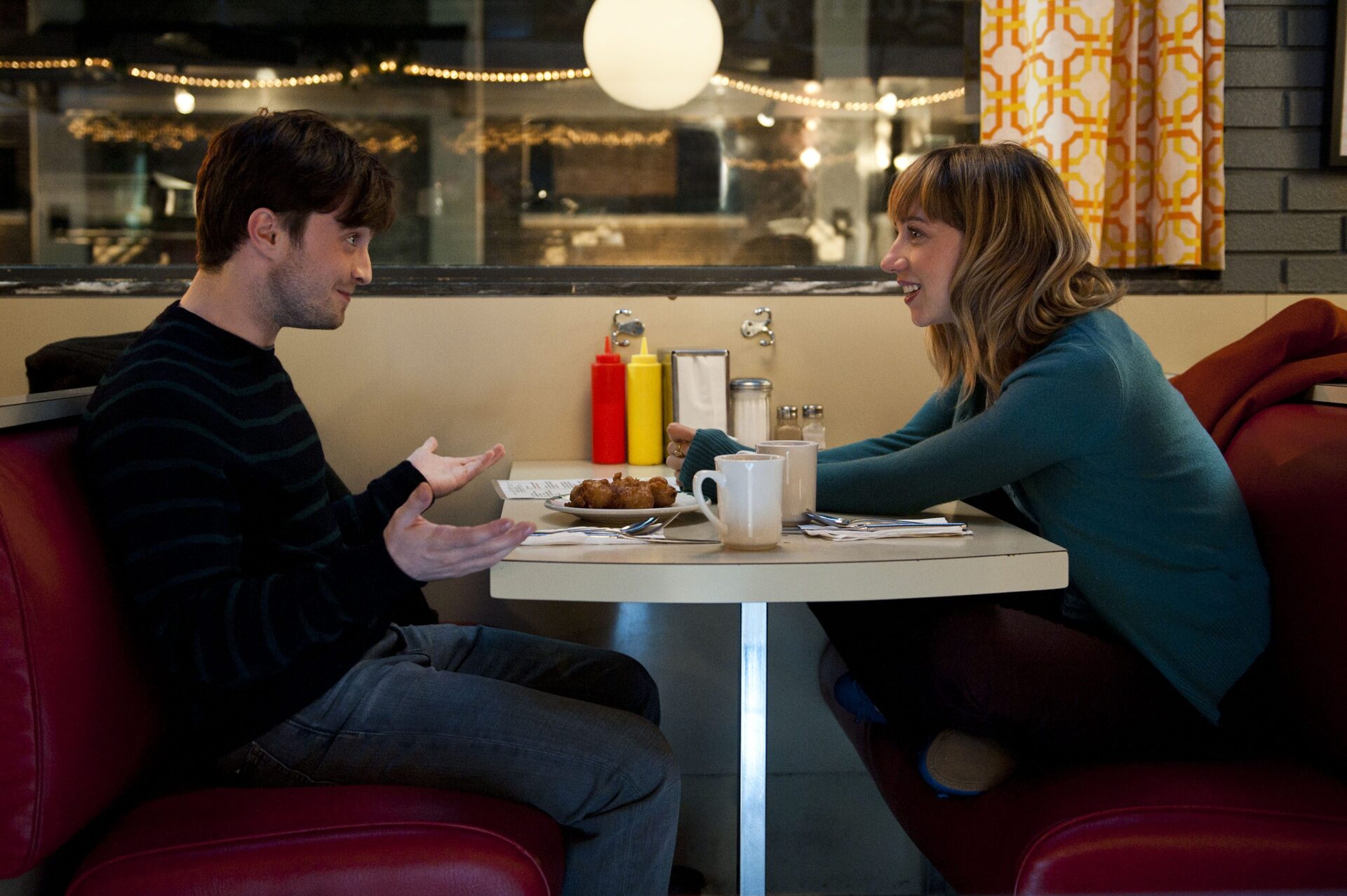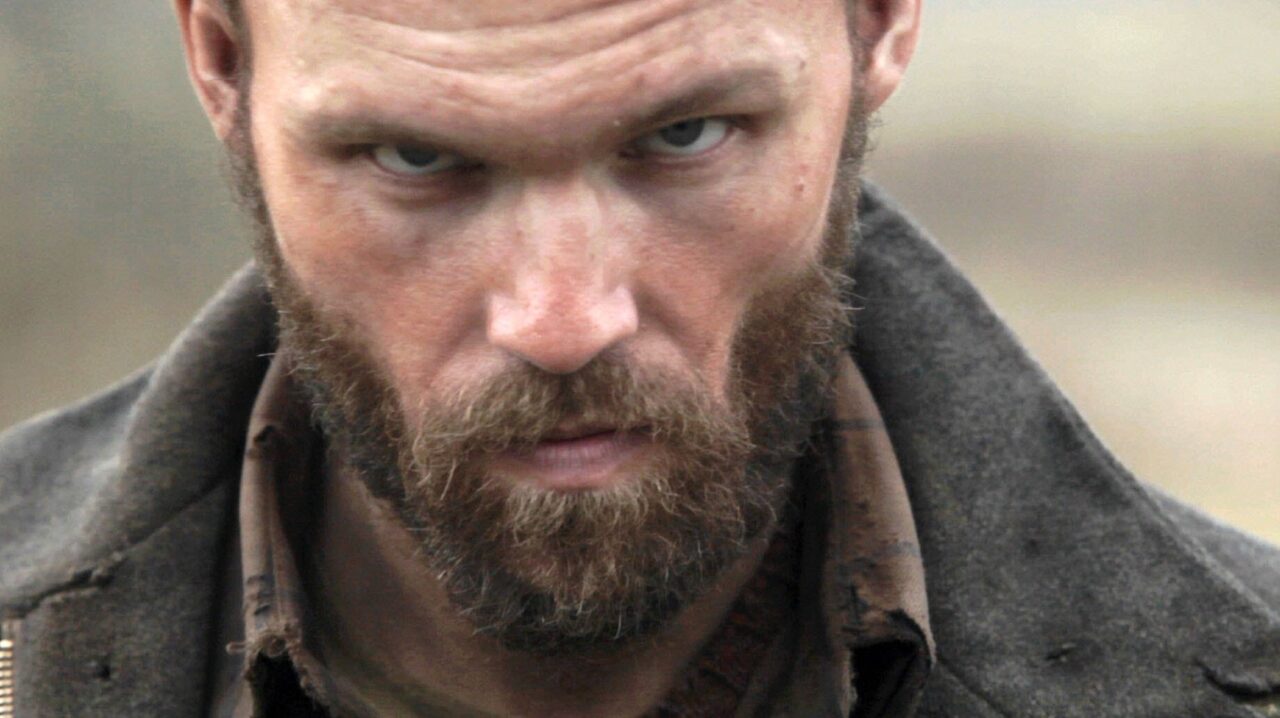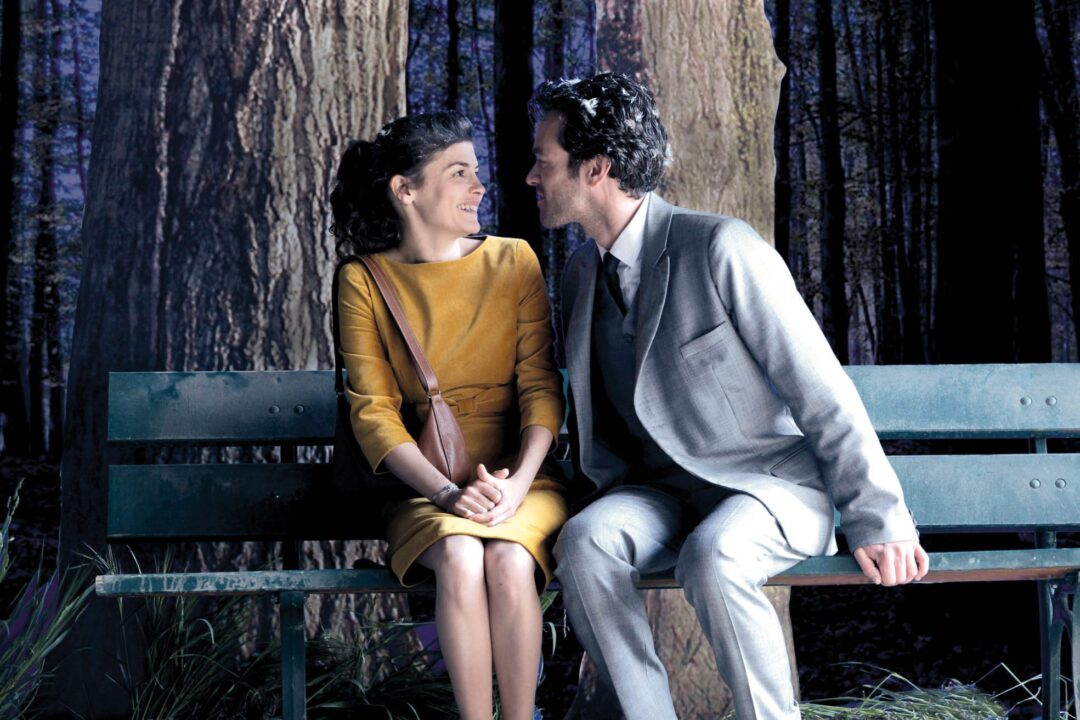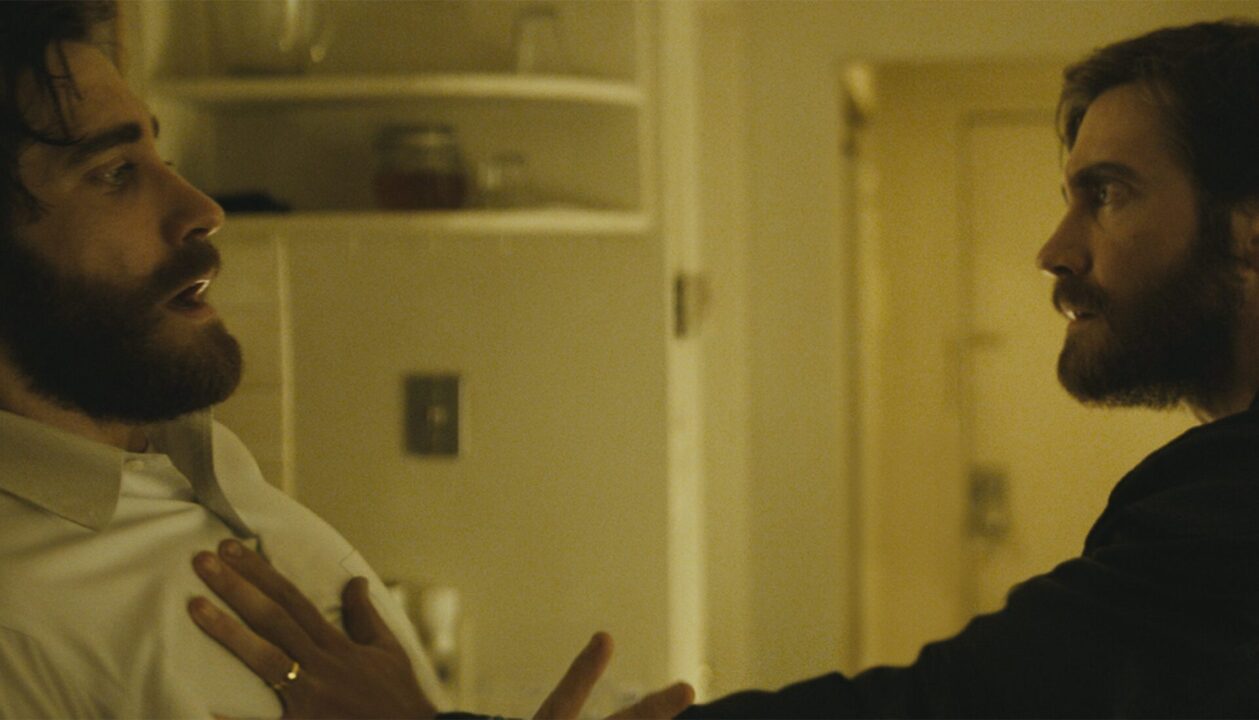Miles Teller, J.K. Simmons, and Damien Chazelle on 'Whiplash'
Whiplash is a film that’s been buzzing since it snagged both the Grand Jury Prize and Audience Award in the drama category earlier this year at Sundance. It is filmmaker Damien Chazelle’s debut feature film and quite a remarkable work that will easily make its way into the canon of brilliant films depicting musicians. While the relationship between the lead characters of the film, a jazz student drummer and his demanding music teacher, is as tense as can be, costars Miles Teller and J. K. Simmons could barely mask their real life friendship as they bantered back and forth throughout the interview. Simmons could barely answer a single question without playfully poking fun at Teller, resulting in endless laughs from the press. We begin:
DO YOU THINK ARTISTS ACTUALLY WANT THE KIND OF PRESSURE THAT TERRENCE FLETCHER PUTS ON ANDREW?
J.K. Simmons: (to Teller) What do you think, bitch?
[Laughs]
Miles Teller: For me, the greatest success that I’ve had on any project comes through collaboration. I wouldn’t want to do a movie where after everything I do, the director just says ‘good job.’ At the same time, I’ve been on movies where I wasn’t able to do the stuff I wanted to. It’s a fine line, but at the end of the day, I do need somebody to oversee what I’m doing. I like directors that will inspire me and give me ideas.
J.K.S: God, he goes on, doesn’t he?
[Laughs]
J.K.S: But to answer your question: God, I hope not. Masochists, I guess. I agree with the benefits of being pushed and directed, but that kind of manipulation and abuse has no place in life.
MILES, YOUR PUT YOUR BLOOD, SWEAT, AND TEARS INTO THIS ROLE. CAN YOU GO INTO THE DETAILS OF THIS PROCESS A LITTLE? IS WHAT WE HEAR ALL YOU ON THE DRUMS, OR WAS THE SOUND SWEETENED IN POST-PRODUCTION?
MT: I hope it was sweetened a little bit, because at the end of day, Andrew is a much better drummer than I am. But I have a pretty good skill set. When I read the script, there’s all this talk of blood splattering on the drums. I thought it was too much, but Damien said to me, ‘When I played, all my drumsticks were covered in blood. This is truthful.’ I got real blood blisters and we bandaged them up. Filming a movie like this in 19 days with intense drum sequences, a lot of that sweat is real. And that’s great because you don’t have to act when you’re actually playing to exhaustion. I remember J.K. told me to hold back, he said, ‘We’re gonna have a couple takes, you should save some.’ So a lot of it was life imitating art.
Damien Chazelle: We did a lot of work in the editing room. But a lot of [the drumming] is either raw stuff on set or pre recordings. But everything you see in the movie, pretty much, is Miles.
HOW MUCH REHEARSAL PREP WAS THERE? HOW MANY TAKES DID YOU NEED WHEN YOU SHOT THAT?
DC: With this kind of schedule, we didn’t have that many takes at our disposal. We also didn’t have time to rehearse. Everything was very short changed, and you worry about that in the moment. But when you have [actors] like this, they brought it everyday. There’s a lot of stuff in the movie we knew we had to get in one or two takes. The scene where J.K. circles through the three drummers was done as a single take multiple times. We did probably 12-15 takes of that, and it’s about a 5 minute scene, I think Miles was pretty pissed by the end.
[Laughs]
FOR MILES AND J.K., WHAT DID YOU DRAW UPON FOR INSPIRATION TO CREATE THESE AMAZING CHARACTERS?
J.K.S: There was no conscience role model I used. It was all there on the page. I understood it and I knew I was the guy to lift it off the page. Miles and I really settled into a rhythm and had a good time.
MT: Same thing for me, people asked me if I asked Damien for advice, since it was autobiographical, but not really. I asked him a few technical drumming questions, but it was very clear on the page what Andrew was all about. Andrew wants to be the greatest drummer of all time.
"Even as a script, there were different reactions. People who hadn’t been in this world, the immediate thought was: it can’t be like this. But when I showed it to drummers, they thought it didn’t go far enough. They thought it should be worse. There’s a whole side to this world people don’t know about." -Damien Chazelle (Director)
THE END OF THIS MOVIE IS SO REMARKABLY CATHARTIC. HOW EAGER ARE YOU TO SORT OF ROMANTICIZE THE NOTION OF BEING SUBJECTED TO SOMETHING THAT YOU NOT ONLY SURVIVE BUT ARE ABLE TO REACH ANOTHER ARTISTIC LEVEL?
DC: It’s tough because the movie operates on the screen way differently than it did on the page. When [I was] writing it, in my mind it was a more tragic ending than victorious. Almost like someone gladly returning to an abusive relationship. But on the screen, you film a great drum solo to that type of music and it does something. My hope through the scene was to give you a kinetic rush but leave you with a question that makes that rush a little more troubling.
I KNOW IN THE DRUM-CORE WORLD, WE HAD INSTRUCTORS WORSE THAN YOU, J.K., AND IT MADE US BETTER DRUMMERS. DAMIEN, HOW IMPORTANT WAS IT TO CONVEY THAT?
DC: Even as a script, there were different reactions. People who hadn’t been in this world, the immediate thought was: it can’t be like this. But when I showed it to drummers, they thought it didn’t go far enough. They thought it should be worse. There’s a whole side to this world people don’t know about. A lot of music movies fit into a certain mold, but it was important that this movie showcased things that hadn’t been seen before. I had a teacher like J.K., and it made me a better drummer. But as a humanist, I can’t condone what he does. I wanted to make the character as monstrous as possible. But there’s this streak of tyranny leading to great musicianship in jazz history.
J.K.S: When I met Miles, I wanted to go farther.
MT: Bring it on, bitch.
[Laughs]
J.K.S: Damien and I have similar philosophies there. I love that this movie inspires debate. How far is too far? This kind of relentless abuse might be necessary if you’re training navy seals, but I don’t know if it's appropriate in music school. But it’s there, and it can be productive, there’s no denying it. But I would rather have a pretty girlfriend than make my hands bleed all the time.
DAMIEN, WERE YOU NERVOUS FOR THE PREMIERE AT SUNDANCE?
DC: Movie screenings remind me of being a drummer on stage. It’s my new form of stage fright. Except you have no control over it. We were opening night at Sundance, it felt like a tough spot. But it was great. It was a fun week of sleeplessness.
MILES, IN TERMS OF HOW IMPORTANT "CARAVAN" [A PRESTIGIOUS JAZZ ENSEMBLE] WAS TO ANDREW IN THE FILM, HOW IMPORTANT DO YOU THINK THIS ROLE IS FOR YOU WHEN IT COMES TO YOUR ACTING CAREER?
MT: I have not read a script that has demanded so much from a character. I was happy that Damien had me in mind for the role. This is a movie that’s almost shot like a boxing movie. You’ve got two characters going head to head. I thought it was cool, man. It has everything that I want to be part of. It’s unapologetic, it pushes the boundaries, and it will create discourse. This is everything I could’ve asked for in a project.
Whiplash opens in theaters this Friday.
Review: 'God Help The Girl'
Grab your thick rimmed glasses, a nice button up cardigan, some fancy socks, and get ready to sing and dance your butt off.
God Help the Girl is the feature debut from Belle & Sebastian frontman Stuart Murdoch. Clearly a passion project for Murdoch, his debut film is all about youthful energy and pure emotion. God Help the Girl begins with the escape of Eve (Emily Browning), who is being kept in a mental health facility due to an eating disorder. Upon freeing herself, she soon meets up with the dorky, yet loveable, James (Olly Murdoch), who is an exceptional musician as well as a pool lifeguard. As James swoons over Eve’s songwriting capabilities, he allows her to shack up in an available room at his place. Eve and James complete their freewheeling love trio when they decide to form a band with the ditzy Cassie (Hannah Murray, paying tribute to her Skins character of the same name), who is the “kind of, sort of” musician type.
From there, we have our film. The three young stars begin to run about Glasgow singing, dancing, ranting and learning about life. There are quite a few moments in the film that are just quiet interactions between the trio, which are always a joy to watch. The chemistry between the three actors makes the film much more enjoyable, and one can easily tell that these three share an immense love for Murdoch’s material. The script is well written, and we are treated to some stylish shots, but what Murdoch has really created here is an outlet for some incredibly memorable songs. From the great opening tune to the larger, epic ones, Murdoch’s music is great all around and serves as the bulk of this film’s appeal.
The script is well written, and we are treated to some stylish shots, but what Murdoch has really created here is an outlet for some incredibly memorable songs.
The choreography in the film seems a bit plain at first, but after a while, it seems fittingly so. It doesn’t distract from the music nor the intimacy of the characters. More positives that the film has to offer: the set design and wonderful wardrobe design. Although undeniably hipster, the wardrobe feels genuine, and not cheap. The general film aesthetic feels like the love child of Wes Anderson and Zooey Deschanel, in the best way possible. Murdoch also throws in some clever winks to The Beatles as well as A Hard Day’s Night.
God Help the Girl knows where its strengths lie: within the music and cast. Unlike other musicals such as Across the Universe that focus more on visual cues that melt and blend together with the music, God Help the Girl is mostly significant in that it features Murdoch’s classy tunes. It doesn’t try too hard, it doesn't delve too far into its own quirkiness, which many films with this aesthetic mistakenly do. Murdoch knows when to be serious and when to be silly, and also how the two can, at times, sit side by side. God Help the Girl succeeds in almost every goal it attempts to achieve.
Murdoch’s debut is fantastical and whimsical. It’s a light-hearted and warm film that proves itself with talented songwriting by Murdoch and a great cast that obviously cared dearly for the film’s heart and soul, which is often hard to find.
https://www.youtube.com/watch?v=6jc2gHpNbyc
Review: 'We Could Be King'
In 2013, the Philadelphia school board closed 37 schools, in addition to introducing mass budget cuts and staff layoffs. Among the affected parties were Martin Luther King High and Germantown, two high schools which rivaled each other in sports, as well as social circumstances, often resulting in violence. We Could Be King is a documentary that chronicles the lives of both schools' students and staff as they are all forced to join as one, and overcome the rivalries of the past, both on the field and in the classroom. In his newest film, director Judd Ehrlich provides viewers with a compelling and surprisingly emotional tale of human beings simply attempting to overcome adversity in light of countless setbacks which are out of their control.
Ehrlich is clearly interested in one thing in King, and that is sheer human determination. Different circumstances plague each of our heroes, whether it’s Dontae Angus, a gifted and massive athlete who struggles with school work, or Ed Dunn, a laid off teacher who volunteers as the head coach for the newly conjoined football team. Of all the talented athletes and faculty in the film, Coach Dunn is particularly fascinating to watch. Everything from his peppy mannerisms to his harsh but ever-loving coaching style can be seen as an uplifting force in this sea of darkness that Philadelphia natives face. Dunn is often seen in the film telling his kids to “pick each other up.” About halfway through the film I began to wish that I had a high school coach as inspirational as Dunn.
We Could Be King is a documentary about a group of people who are put to the test by extremely unfortunate circumstances, and by the end of the film, one feels the pride and strength in each character as they succeed.
The film also touches on the struggle that young Salvatore Henderson faces, who spends much of the season behind bars, and then under house arrest. When Henderson gets to attend school with his ankle bracelet and jumps into his first practice, one can’t help but feel for him after seeing the look on his face when he gets back on the field. Moments like this will most certainly catch you off guard and hit you right in the feels.
Though the film primarily focuses on the plight of the school’s football team, it also touches upon parent-teacher relations, as well as the transitional period where students have to learn how to adapt to their fresh surroundings, which isn’t an easy feat as a teenager in a new high school.
King is fairly wide in its reach when it comes to subject matter, and not to say style comes anywhere near content when it comes to documentaries, but it is also exceptionally shot and filled with gorgeous camerawork of the school grounds and the surrounding urban area.
We Could Be King is a documentary about a group of people who are put to the test by extremely unfortunate circumstances, and by the end of the film, one feels the pride and strength in each character as they succeed. The story not only enthralls everyday football fans, or the Friday Night Lights viewership, but even those who know nothing of sports. It’s a film about education, budget cuts, economic turmoil, family struggles, and much more. It is truly a fascinating documentary and one of the most heartfelt films of the year.
https://www.youtube.com/watch?v=ZKLzuNALfrQ
Review: 'About Alex'
Just face it: ever since you graduated college, your tight knit group of friends have all moved back to their respective homes, and now all you share in common is the Facebook group message or GroupMe that attempts to connect everyone in that familiar, special way; but ultimately, fails.
About Alex is the debut feature from writer/director Jesse Zwick, and the film centers around Alex (Jason Ritter) and his recent attempted suicide. This tragic event prompts his old group of college buddies, who are admittedly not as close as they all used to be, to come together for a little reunion of sorts. The group then plays catch up and tries to keep an eye on Alex to ensure his safety. The core family consists of Ben (Nate Parker), the writer who hasn’t worked on his book in over a year, his girlfriend Siri (Maggie Grace), the anxious, Xanax queen Sarah (Aubrey Plaza), the cynical doctoral candidate Josh (Max Greenfield), and Isaac (Max Minghella) the friend who brings his new 22 year old girlfriend Kate (Jane Levy) to the group.
The plot of About Alex, as well as the character archetypes, is far from original. In fact, the film even gets a bit self-aware and points to the fact that it feels like an “old 80s movie,” referencing The Big Chill, among other siblings. But even though the film is aware that it’s paying homage as opposed to breaking new ground, things border on groaning cliche at a few points.
The plot of About Alex, as well as the character archetypes, is far from original. In fact, the film even gets a bit self-aware and points to the fact that it feels like an “old 80s movie,” referencing The Big Chill, among other siblings.
With decent performances from most of the core cast, including Grace, Parker, Minghella and Levy, the strongest performances come from indie starlet Aubrey Plaza and New Girl star Max Greenfield, which doesn’t come as a surprise. While Greenfield as Josh is perhaps the most interesting character to watch on screen, his intelligent cynicism unfortunately becomes cringe-worthy, more than occasionally. At this point in cinema, the character who bashes on technology with the same measly “put your phone down and live in the moment” argument is a tad trite. Films like Boyhood make the same complaints and observations about technology, but in longer, more elaborate ways that make more sense than the plain, cliche statements you hear everyday in the office.
Without giving too much away, one quickly begins to realize that the core group in the film are pretty similar to ensemble groups seen in Friends or How I Met Your Mother. That is to say that they are playing relationship musical chairs; everyone has slept with everyone, and it doesn’t seem to negate the closeness or openness of the group, but rather, seems to improve it.
Zwick could have done a tad better job with character development and arcs as opposed to throwing in “juicy” yet meaningless pseudo-dramatic events like small car wrecks, etc. On the plus side, the film’s soundtrack is hip and hits all the right spots and, when appropriate, fills you with the appropriate emotion. In the flashback scene that concludes the film, I was taken aback by how sentimental I became.
About Alex does not break any new ground in cinema whatsoever, but it doesn’t attempt to. It’s a surprisingly emotional debut from writer/director Zwick, and though the film feels extremely familiar, as do most of the characters that appear in it, it’s a warm, comfy way to spend 90 minutes.
https://www.youtube.com/watch?v=YGraucjOUGI
Review: 'What If'
Can men and women truly interact and be noble acquaintances without the pressure of romantic interest and relations? Many films have attempted to provide us with an answer to this infinitely important question, but few have succeeded. One thing is for certain, however; few men can bear to hear the statement “I think we should just be friends” without slowly self-destructing on the inside.
What If was previously titled The F Word (which implies “friends”, not the other word) when it made its festival circuit, and stars Daniel Radcliffe as Wallace, an introverted and slightly damaged young man who is still recovering from his last big breakup, along with the fact that he dropped out of medical school. One night at his friend Allan’s (Adam Driver) party, he runs into a hip, quirky, young lady named Chantry (Zoe Kazan). After Wallace finds out Chantry has a boyfriend, they agree to be friends. Fortunately for us, these characters do what movie characters often do: get themselves entangled in a bunch of complicated relationship shenanigans.
The screenplay, though fairly predictable, is solid in its heartfelt comedy and earnestness. Adapted from a play by T.J. Dawe and Michael Rinaldi, the script made the Black List back in 2008. The dialogue and cultural aesthetic in the film is somewhat similar to HBO’s Girls, which isn’t a bad thing at all. Radcliffe and Kazan have plenty of hilarious zingers to deliver here, and these clever one-liners will hit home among fellow quirky twenty-somethings. While Kazan’s performance is playful and sweet, Radcliffe shines and proves himself a true comedic talent. The two leads have excellent chemistry together as well, and many film-goers will recall When Harry Met Sally when they hear Radcliffe and Kazan banter on screen.
Radcliffe and Kazan have plenty of hilarious zingers to deliver here, and these clever one liners will hit home among fellow quirky twenty-somethings.
The soundtrack is another standout in the film, as are these small moments where Chantry’s illustrations come to life on the screen in a mystical way. These few moments of magical realism are a nice touch and add greatly to the overall warm feel of the film, but the best part about What If is the undeniably wonderful supporting performance by Adam Driver. The man steals every single scene he appears in, and I daresay he outshines Radcliffe in terms of comedic timing and charm.
What If has a simple, sweet and effective quality about it that makes the film wildly stand out among its other recent rom-com counterparts. With wonderful performances from the cast all around, especially Girls breakout star Adam Driver, the film offers fun and realistic interactions between twenty-somethings and their obsession with dry wit and sarcasm. What If also offers an incredible soundtrack that packs heavy emotion in unexpected moments. The film is incredibly self-aware of its place in the cinematic universe of romantic comedies, and this is yet another plus that makes it worth watching.
https://www.youtube.com/watch?v=A86JGbBEaBk
Review: 'Child of God'
James Franco is a man of many intriguing hobbies, one of which is choosing novels that are usually regarded as “unfilmable” and adapting them into feature films. Lately, Franco is on a roll when it comes to adapting rather difficult literary content. Franco now has two Faulkner novels under his belt, As I Lay Dying and The Sound and the Fury, both of which were nontraditional in narrative and form. His latest adaptation is based on a Cormac McCarthy novel, Child of God, which is a short book filled with beautiful minimalist prose and a protagonist who does not fall under the usual hero archetype.
Child of God opens with a voiceover that is pulled directly from McCarthy’s text and jumps in immediately with a scene that introduces us to the isolated and mentally unstable Lester Ballard (Scott Haze) as he faces off against an entire mob of citizens, ultimately getting his head bashed with a rifle. Franco’s vision in Child of God is very close to the source novel and does not shy away from any of the dark subject matter, that is often uncomfortable but oddly humorous.
Franco is not interested in flashy cinematic shots here, more so in the minimalist style and honest character study of Lester Ballard, which is where Child of God really shines. Newcomer Scott Haze’s performance as Lester is phenomenal in a scary way. Variety even named him one of the top 10 “Actors to Watch” back in 2013. Haze reportedly fled to Tennessee to prepare for the role as soon as Franco offered it to him, and spent many nights sleeping in caves in an attempt to emotionally and physically embody Ballard. It’s safe to say that Haze’s preparation truly paid off here in one of the most serious performances in a film all year.
(Newcomer Scott) Haze reportedly fled to Tennessee to prepare for the role as soon as Franco offered it to him, and spent many nights sleeping in caves in an attempt to emotionally and physically embody Ballard.
Every facet of the lead performance here, from the way Haze drags his body around, to the animalistic yelps and screams, Lester Ballard is an absurdly compelling figure to watch on the big screen. In a strange but funny moment, we even see Lester defecate in the woods and wipe himself. Moments like this would never see the light of day in a big budget studio film, yet they add to the entire aesthetic here in bizarre, unexplainable ways. Lester’s eyes are wild and he doesn’t speak like a human. He carries corpses with humorous unease, lugging them around unsuccessfully for the most part. Lester is a monster roaming 1960s Tennessee and is ultimately looking for human love, just in different ways than we are used to seeing on film.
Speaking of love, the scenes of necrophilia are handled with surprising maturity here, though it isn’t Franco’s first attempt at necrophilia on film (see his short film “Herbert White” starring Michael Shannon). Regarding these particular scenes, some viewers will find them unpleasant to sit through, but I truly believe Franco navigated this subject without being the slightest bit “icky.”
In the end, the audience does not get to see Ballard pay for what he’s done. Child of God is the antithesis of a Hollywood film and solely cares about being true to McCarthy’s art. Regardless of what you think about Franco and his ever-growing collection of books, films and artwork, one has to compliment him on making a film that would otherwise never be made by any studio. If anything is certain, it is that Franco has an immense passion for literature and can be absolutely trusted with an otherwise “unfilmable” source material.
https://www.youtube.com/watch?v=0KnbqSf9eWE
Review: 'Mood Indigo'
As Eternal Sunshine of the Spotless Mind is one of my favorite films of recent years, I was looking forward to director Michel Gondry’s latest surrealist project. I even found myself squirming with anticipation in the viewing room and audibly giggling before the screening began. But upon finishing Mood Indigo, I had mixed feelings about this French visionary’s most recent work.
Gondry’s latest surrealist affair is an adaptation of the previously regarded “unfilmable” novel, Froth on a Daydream, which is written by French polymath Boris Vian. Mood Indigo focuses on Colin (Romain Duris), a happy-go-lucky and rather proper man who resides in a lively little apartment with his chef and lawyer, Nicolas (Omar Sy). Soon enough, Colin meets Chloe (Audrey Tautou) and falls in love almost immediately, as most fictional characters do. The two then partake in lovey dovey adventures throughout Paris, and what follows is an immensely imaginative and quite colorful experience, including a scene where Chloe and Colin ride through the sky on a cloud. But unfortunately, Mood Indigo quickly begins to focus too much on spectacle rather than emotion, tone, and compelling romance.
Mood Indigo quickly begins to focus too much on spectacle rather than emotion, tone, and compelling romance.
For instance, our two leading protagonists seem to jump onto the altar together before one can even begin to become emotionally invested in either character. The wedding scene is rather entertaining and memorable, luckily, with a split screen showcasing rain on one side and radiant sunshine on the other. But their honeymoon comes to an end when a doctor (played by Gondry himself) tells Chloe that she has a flower growing in her lungs and she will die unless she is kept close to fresh flowers.
Interestingly, as Chloe’s condition begins to worsen, the apartment itself changes as well. Colin’s apartment serves as a living, breathing organism in the film, and things such as color and size, and even small details often reflect Chloe’s personal state of health.
Mood Indigo’s visuals are quite the wondrous feat. A mixture of homemade special effects and stop motion, creativity is something Gondry excels in once again. But even so, the surrealism starts to become exhausting and even distracting mid-film. I found that I was completely detached from the characters and that I was simply watching wacky surrealist interactions occur on all corners of the screen at all times.
Whether or not the source material is to blame here is questionable, suffice it to say that I sure do miss a writer like Kaufman collaborating with Gondry, because Mood Indigo is like a never ending set of cute stunts, which feel more like a series of music videos than a narrative film. Even with the American cut, which is down to 90 minutes, the film seemed too long.
While certain images and set pieces from the film have definitely become unstuck in my mind, for instance a piano that makes cocktails or the room full of typists who are writing out Colin’s life on endless typewriters, the story is too emotionless and full of sensory overload for anyone to care too much about this Gondry flick, which is truly tragic.
https://www.youtube.com/watch?v=dh3V-dFlmyk
Review: 'Enemy'
Enemy opens in some type of mysterious underground sex club, where women perform erotic acts with tarantulas. And here’s the thing: it only gets weirder from there.
Director Denis Villeneuve actually released two films at last year’s Toronto International Film Festival. The first of which, Prisoners, received critical acclaim and was included in many filmgoers’ top ten lists of 2013. Now with his film Enemy, he is pushing the psychological thriller genre to new boundaries. Part existential thriller and part hypersexual exploration of the subconscious, viewers have so far pegged Enemy in the same sentence as Hitchcock, Cronenberg, and Lynch, and this high company is well deserved.
Enemy stars Jake Gyllenhaal as Adam Bell, a bored college professor who seems to constantly be lecturing to his students on the importance of repetition, specifically in relation to history. His relationship with his girlfriend Mary (Mélanie Laurent) is exceptionally dull, other than bouts of animalistic sex. One night, Adam rents a film, in which he realizes that he shares an uncanny resemblance to “Bellhop #3.” Adam slowly becomes obsessed with this actor, and ultimately seeks him out to attempt to put reason to this odd dream-like realization. That’s all I really can say with certainty about the plot of this film.
Enemy is an episode of the twilight zone, shot like an arthouse film, with the sexual consciousness of Kubrick’s Eyes Wide Shut.
Enemy is filled to the brim with bizarre and dream-like imagery, much of which, unfortunately for arachnophobes, involves spiders, women’s high heels, and sex. There is so much material to explore in this aspect that the film definitively requires multiple viewings.
Although Enemy is an impressive and impeccably well-made film, the elliptical, dense nature may be too strenuous for some viewers to handle. The film works with the slowest of slow burns and is overtly difficult to interpret. However, once the film hooks you, it’ll leave you watching so obsessively you’ll find yourself in a pile of your own drool.
Gyllenhaal is incredible in the film and does an absurdly fantastic job of creating two unique personalities between his two characters, which by the end of the film, are distinguishable just by facial expression. Sarah Gadon’s performance stands out as well as the doppelganger's pregnant wife.
Cinematographer Nicolas Bolduc shoots the film with a rotten yellow tint, which adds to the atmosphere immensely. The aerial shots that look up into the skyscrapers will make you legs feel wobbly.
The moment the credits rolled on this film, I felt a number of things. I immediately became anxious for a second viewing. I wanted to sprint home and begin research on what others were saying about the film. I also felt my fear of spiders escalate tenfold. Enemy is an episode of the twilight zone, shot like an arthouse film, with the sexual consciousness of Kubrick’s Eyes Wide Shut.
https://www.youtube.com/watch?v=FJuaAWrgoUY



